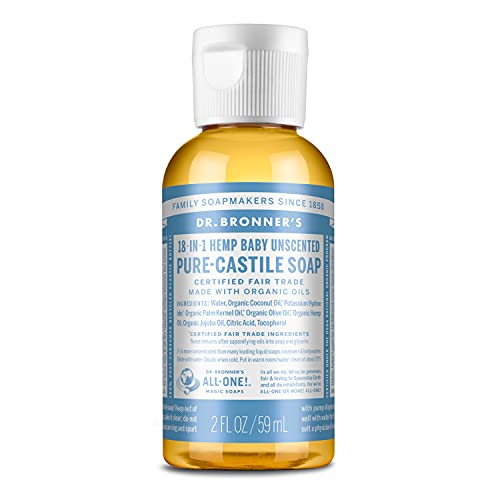
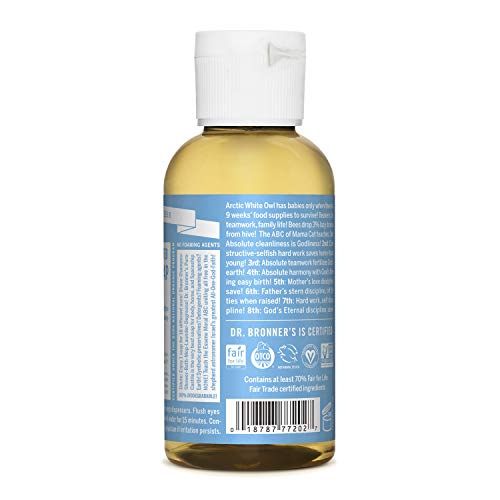
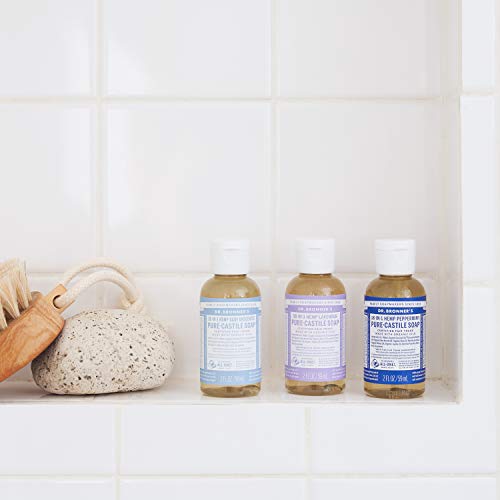
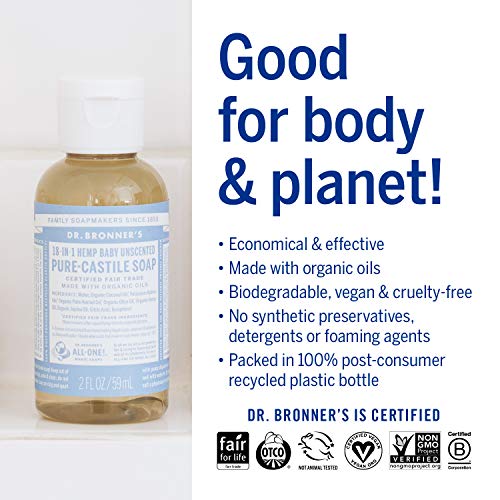
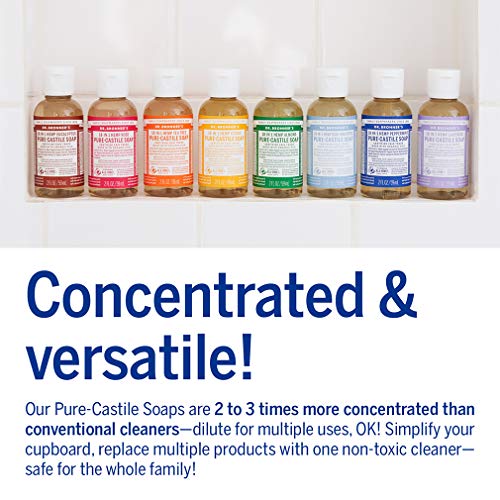
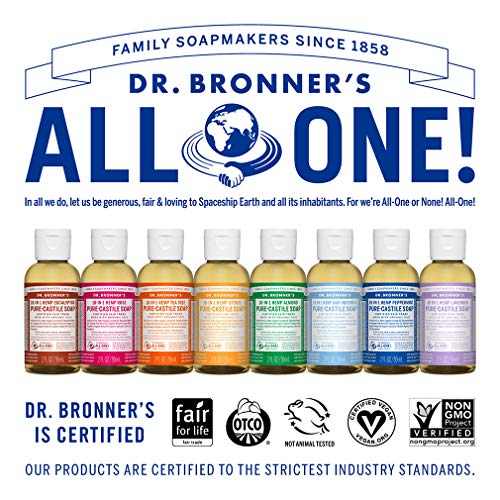
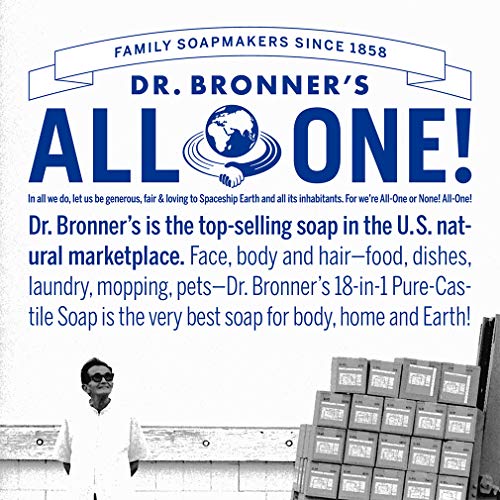
Dr. Bronner’s Baby Shampoo & Body Wash - Organic Oils, 18-in-1 Uses, Vegan - 2oz Travel Size


Cannabis Sativa (Hemp) Extract
High RiskCannabis sativa (hemp) extract is derived from the hemp plant, primarily used for its potential therapeutic properties. It contains various cannabinoids, flavonoids, and terpenes, which may contribute to its functional benefits in cosmetic and wellness products. The extract is often sought for its calming and anti-inflammatory effects.
Sustai Insights
Cannabis sativa (hemp) extract offers functional benefits such as anti-inflammatory properties and potential skin-soothing effects. It is derived from sustainably sourced hemp, contributing to its appeal. However, there are health risks associated with its use, including low concerns for carcinogenicity and neurotoxicity. Regulatory restrictions exist in certain jurisdictions, marking it as high risk overall. Safe usage should be practiced, particularly in sensitive applications, and alternatives like hemp seed oil may be considered for specific uses.
Potassium Hydroxide
High RiskPotassium hydroxide is a caustic inorganic base commonly used in various products for its ability to adjust pH levels and act as a cleaning agent. It is highly soluble in water and can produce heat upon dissolution, making it effective in certain formulations.
Sustai Insights
Potassium hydroxide serves as a strong pH adjuster and cleaning agent, but it poses significant health risks due to its caustic nature, which can cause irritation to skin and eyes. Environmental concerns include its potential to contribute to water pollution. Regulatory bodies have imposed strict usage restrictions due to these hazards, leading to a high-risk overall assessment. Safe handling practices are essential, and alternatives such as citric acid may provide safer pH adjustment without the associated risks.
Citric Acid
Medium RiskCitric acid is an alpha hydroxy acid used in personal care products primarily for its role as a pH adjuster and natural preservative. It occurs naturally in citrus fruits and is commonly utilized in various formulations for its chelating properties and mild exfoliation benefits.
Sustai Insights
Citric acid offers functional benefits as an effective preservative and pH stabilizer, contributing to product longevity and stability. It is biodegradable and derived from renewable sources. Health risks are low, with minimal concerns regarding carcinogenicity, allergies, and reproductive toxicity. However, moderate use restrictions exist due to potential irritation at high concentrations. Environmental risks are limited, as citric acid is not known to accumulate in ecosystems. Regulatory agencies have no significant advisories against its use. Overall, it is assessed as a medium-risk ingredient, with safe usage practices recommended and alternatives available.
Cocos Nucifera (Coconut) Oil
Low RiskCocos Nucifera (Coconut) Oil is derived from the kernels of the coconut palm. It is primarily used in cosmetic formulations for its emollient and moisturizing properties, making it suitable for skin and hair care products.
Sustai Insights
Coconut oil serves as an effective moisturizer and emollient, promoting skin hydration and softness. It is sustainably sourced and biodegradable. Health risks are minimal, with low concerns regarding carcinogenicity, allergens, and reproductive toxicity. Environmental impact is also low, as it does not contribute significantly to pollution or bioaccumulation. Regulatory bodies have not issued restrictions on its use. Overall, coconut oil presents a low risk for health and environmental concerns, making it a safe ingredient in cosmetic products.
Tocopherol, D Alpha
Low RiskTocopherol, specifically d-alpha tocopherol, is a naturally occurring form of Vitamin E. It is commonly used in cosmetic and personal care products primarily for its antioxidant properties, helping to protect formulations from oxidation and extend shelf life.
Sustai Insights
D-alpha tocopherol provides effective antioxidant benefits, contributing to product stability. It is sustainably sourced and generally regarded as safe, with low concerns regarding carcinogenicity, allergies, and reproductive toxicity. However, there are minor concerns about endocrine disruption. Regulatory bodies have not imposed significant restrictions, indicating low overall risk. Recommended usage practices include adhering to established safe concentration thresholds. Alternatives, such as other forms of Vitamin E or plant-based antioxidants, may also be considered.
Simmondsia Chinensis (Jojoba)
Low RiskSimmondsia chinensis, commonly known as jojoba, is an oil derived from the seeds of the jojoba plant. It is commonly used in cosmetic formulations for its moisturizing properties, acting as an emollient and skin conditioning agent.
Sustai Insights
Jojoba oil offers functional benefits such as effective skin moisturization and is biodegradable, with sustainable sourcing practices. Health risks are low, with minimal concerns regarding carcinogenicity, allergies, and reproductive toxicity. Environmental impact is negligible, with no pollutant or bioaccumulation potential. Regulatory status is favorable with no significant restrictions noted. Overall, it is assessed as low risk, and safe usage practices should be maintained. Alternatives include other plant-derived oils like argan or almond oil, which may provide similar benefits.
Water
Low RiskWater is a clear, colorless liquid essential for various biological processes. It serves as a solvent in formulations, facilitating the dissolution of other ingredients and enhancing product texture and application. Additionally, water plays a crucial role in hydration and is a key component in many cosmetic and personal care products.
Sustai Insights
Water is an effective solvent and hydrator, contributing to the texture and efficacy of formulations. It is biodegradable and generally regarded as safe, with low concerns regarding carcinogenicity, allergies, and reproductive toxicity. However, excessive water usage can lead to environmental concerns, particularly regarding resource depletion. Regulatory bodies do not impose restrictions on water use in cosmetics. Overall, the risks associated with water are low, making it a safe and essential ingredient.
Cannabis Sativa (Hemp) Extract
High RiskCannabis sativa (hemp) extract is derived from the hemp plant, primarily used for its potential therapeutic properties. It contains various cannabinoids, flavonoids, and terpenes, which may contribute to its functional benefits in cosmetic and wellness products. The extract is often sought for its calming and anti-inflammatory effects.
Sustai Insights
Cannabis sativa (hemp) extract offers functional benefits such as anti-inflammatory properties and potential skin-soothing effects. It is derived from sustainably sourced hemp, contributing to its appeal. However, there are health risks associated with its use, including low concerns for carcinogenicity and neurotoxicity. Regulatory restrictions exist in certain jurisdictions, marking it as high risk overall. Safe usage should be practiced, particularly in sensitive applications, and alternatives like hemp seed oil may be considered for specific uses.
Cocos Nucifera (Coconut) Oil
Low RiskCocos Nucifera (Coconut) Oil is derived from the kernels of the coconut palm. It is primarily used in cosmetic formulations for its emollient and moisturizing properties, making it suitable for skin and hair care products.
Sustai Insights
Coconut oil serves as an effective moisturizer and emollient, promoting skin hydration and softness. It is sustainably sourced and biodegradable. Health risks are minimal, with low concerns regarding carcinogenicity, allergens, and reproductive toxicity. Environmental impact is also low, as it does not contribute significantly to pollution or bioaccumulation. Regulatory bodies have not issued restrictions on its use. Overall, coconut oil presents a low risk for health and environmental concerns, making it a safe ingredient in cosmetic products.
Citric Acid
Medium RiskCitric acid is an alpha hydroxy acid used in personal care products primarily for its role as a pH adjuster and natural preservative. It occurs naturally in citrus fruits and is commonly utilized in various formulations for its chelating properties and mild exfoliation benefits.
Sustai Insights
Citric acid offers functional benefits as an effective preservative and pH stabilizer, contributing to product longevity and stability. It is biodegradable and derived from renewable sources. Health risks are low, with minimal concerns regarding carcinogenicity, allergies, and reproductive toxicity. However, moderate use restrictions exist due to potential irritation at high concentrations. Environmental risks are limited, as citric acid is not known to accumulate in ecosystems. Regulatory agencies have no significant advisories against its use. Overall, it is assessed as a medium-risk ingredient, with safe usage practices recommended and alternatives available.
Tocopherol, D Alpha
Low RiskTocopherol, specifically d-alpha tocopherol, is a naturally occurring form of Vitamin E. It is commonly used in cosmetic and personal care products primarily for its antioxidant properties, helping to protect formulations from oxidation and extend shelf life.
Sustai Insights
D-alpha tocopherol provides effective antioxidant benefits, contributing to product stability. It is sustainably sourced and generally regarded as safe, with low concerns regarding carcinogenicity, allergies, and reproductive toxicity. However, there are minor concerns about endocrine disruption. Regulatory bodies have not imposed significant restrictions, indicating low overall risk. Recommended usage practices include adhering to established safe concentration thresholds. Alternatives, such as other forms of Vitamin E or plant-based antioxidants, may also be considered.
Simmondsia Chinensis (Jojoba)
Low RiskSimmondsia chinensis, commonly known as jojoba, is an oil derived from the seeds of the jojoba plant. It is commonly used in cosmetic formulations for its moisturizing properties, acting as an emollient and skin conditioning agent.
Sustai Insights
Jojoba oil offers functional benefits such as effective skin moisturization and is biodegradable, with sustainable sourcing practices. Health risks are low, with minimal concerns regarding carcinogenicity, allergies, and reproductive toxicity. Environmental impact is negligible, with no pollutant or bioaccumulation potential. Regulatory status is favorable with no significant restrictions noted. Overall, it is assessed as low risk, and safe usage practices should be maintained. Alternatives include other plant-derived oils like argan or almond oil, which may provide similar benefits.
Water
Low RiskWater is a clear, colorless liquid essential for various biological processes. It serves as a solvent in formulations, facilitating the dissolution of other ingredients and enhancing product texture and application. Additionally, water plays a crucial role in hydration and is a key component in many cosmetic and personal care products.
Sustai Insights
Water is an effective solvent and hydrator, contributing to the texture and efficacy of formulations. It is biodegradable and generally regarded as safe, with low concerns regarding carcinogenicity, allergies, and reproductive toxicity. However, excessive water usage can lead to environmental concerns, particularly regarding resource depletion. Regulatory bodies do not impose restrictions on water use in cosmetics. Overall, the risks associated with water are low, making it a safe and essential ingredient.
Potassium Hydroxide
High RiskPotassium hydroxide is a caustic inorganic base commonly used in various products for its ability to adjust pH levels and act as a cleaning agent. It is highly soluble in water and can produce heat upon dissolution, making it effective in certain formulations.
Sustai Insights
Potassium hydroxide serves as a strong pH adjuster and cleaning agent, but it poses significant health risks due to its caustic nature, which can cause irritation to skin and eyes. Environmental concerns include its potential to contribute to water pollution. Regulatory bodies have imposed strict usage restrictions due to these hazards, leading to a high-risk overall assessment. Safe handling practices are essential, and alternatives such as citric acid may provide safer pH adjustment without the associated risks.
Experience the gentle touch of Dr. Bronner’s Pure-Castile Liquid Soap, the perfect solution for environmentally-conscious parents seeking a versatile, safe, and effective baby shampoo and body wash. This travel-sized 2-ounce bottle is ideal for on-the-go families who prioritize sustainability and health.
- Made with Organic Oils: Crafted from over 70% certified organic and fair trade ingredients, supporting ethical farming and healthy communities.
- Versatile Usage: This concentrated soap serves 18 different purposes, from baby bathing to laundry, making it a cost-effective and space-saving choice.
- No Harmful Additives: Free from synthetic preservatives, detergents, or foaming agents, ensuring a safe product for your child's delicate skin.
- Eco-Friendly Packaging: Packaged in 100% post-consumer recycled plastic, contributing to waste reduction and a positive environmental impact.
- Concentration Power: Three times more concentrated than typical liquid soaps, a little goes a long way, reducing packaging waste and enhancing value.
Dr. Bronner’s is committed to ethical practices, making a positive impact on communities and the planet.
Subscribe & Save with Sustai
- Best Price Guarantee: Always enjoy the lowest prices on sustainable home essentials.
- No Surprises: We’ll notify you before shipping. No hidden fees, ever.
- You’re in Charge: Change, pause, or cancel your subscription anytime with ease.
- Eco-Friendly Deliveries: Our grouped shipments mean less packaging and lower emissions.
Join us on a sustainable journey. Special offers for a limited time! Prices and promotions may change.
Recommended Products
Experience the gentle touch of Dr. Bronner’s Pure-Castile Liquid Soap, the perfect solution for environmentally-conscious parents seeking a versatile, safe, and effective baby shampoo and body wash. This travel-sized 2-ounce bottle is ideal for on-the-go families who prioritize sustainability and health.
- Made with Organic Oils: Crafted from over 70% certified organic and fair trade ingredients, supporting ethical farming and healthy communities.
- Versatile Usage: This concentrated soap serves 18 different purposes, from baby bathing to laundry, making it a cost-effective and space-saving choice.
- No Harmful Additives: Free from synthetic preservatives, detergents, or foaming agents, ensuring a safe product for your child's delicate skin.
- Eco-Friendly Packaging: Packaged in 100% post-consumer recycled plastic, contributing to waste reduction and a positive environmental impact.
- Concentration Power: Three times more concentrated than typical liquid soaps, a little goes a long way, reducing packaging waste and enhancing value.
Dr. Bronner’s is committed to ethical practices, making a positive impact on communities and the planet.

You can have at most 2 Sustainable Steals products in your cart
Customer Reviews
Customers’ View
Customers appreciate the effectiveness and eco-friendly nature of this baby shampoo and body wash. Many highlight the high quality and cleaning power, noting it leaves skin feeling soft and clean without stripping natural oils. Users also value its gentle formula, making it suitable for sensitive skin, including that of babies. The unscented option is particularly praised for being safe and soothing, with some users enjoying the subtle natural scent. Additionally, the ethical sourcing of organic ingredients and eco-friendly packaging resonate with environmentally conscious consumers. Overall, customers find this product both effective and aligned with their sustainable lifestyle.
AI-generated from the text of customer reviewsThis product has no reviews yet.




